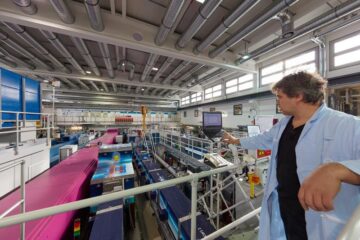Fish oil prevents potentially deadly heart rate variability

A two-gram fish oil supplement given daily to elderly persons prevented a decline in heart rate variability caused by tiny, dangerous airborne pollutant particles. Heart rate variability, a measure of the autonomic nervous system’s regulation of the heart, is an independent risk factor for cardiac arrhythmias, heart attack or sudden death.
These findings appeared in the second issue of the December 2005 American Journal of Respiratory and Critical Care Medicine, published by the American Thoracic Society.
Fernando Holguin, M.D., of the Centers for Disease Control and Prevention in Atlanta, Georgia, and eight associates provided fish oil supplements to 26 residents of a nursing home in Mexico City. A control group of 24 residents was given soy oil supplements. The participants’ average age ranged from 81 to 83 years old.
„In this randomized controlled trial, fish oil supplementation prevented the reduction in heart rate variability associated with the same-day exposure to indoor particulate matter,“ said Dr. Holguin. „In contrast, soy oil, our comparison supplementation of plant-derived polyunsaturated fatty acids, was associated with a marginal, nonsignificant protection from the effects of particulate matter on heart rate variability.“
„Fish oil as a source of omega-3 polyunsaturated fatty acids could be considered as a potential form of preventive measure to reduce the risk of arrhythmia and sudden death in elderly subjects exposed to ambient air pollution,“ said Dr. Holguin.
In the study, the residents were exposed to tiny indoor air pollutant particles that had a dimension of 2.5 micrograms or less. All participants spent 92 percent of their time indoors.
The supplement study was conducted over six months. None of the patients suffered from cardiac arrhythmias, had a pacemaker or were being treated with oral anticoagulants.
Participants had their heart rate variability checked between 8 a.m. and 1 p.m. on alternate weekdays. To ensure accurate measurement, the subjects lay flat on their back five minutes before starting the test. Each electronic analysis lasted 6 minutes as each participant rested.
Prior to the beginning of the study, all participants had a low intake of omega-3 polyunsaturated fatty acids.
The authors called for larger studies to confirm their results.
Media Contact
Weitere Informationen:
http://www.thoracic.orgAlle Nachrichten aus der Kategorie: Medizin Gesundheit
Dieser Fachbereich fasst die Vielzahl der medizinischen Fachrichtungen aus dem Bereich der Humanmedizin zusammen.
Unter anderem finden Sie hier Berichte aus den Teilbereichen: Anästhesiologie, Anatomie, Chirurgie, Humangenetik, Hygiene und Umweltmedizin, Innere Medizin, Neurologie, Pharmakologie, Physiologie, Urologie oder Zahnmedizin.
Neueste Beiträge

Bakterien für klimaneutrale Chemikalien der Zukunft
Forschende an der ETH Zürich haben Bakterien im Labor so herangezüchtet, dass sie Methanol effizient verwerten können. Jetzt lässt sich der Stoffwechsel dieser Bakterien anzapfen, um wertvolle Produkte herzustellen, die…

Batterien: Heute die Materialien von morgen modellieren
Welche Faktoren bestimmen, wie schnell sich eine Batterie laden lässt? Dieser und weiteren Fragen gehen Forschende am Karlsruher Institut für Technologie (KIT) mit computergestützten Simulationen nach. Mikrostrukturmodelle tragen dazu bei,…

Porosität von Sedimentgestein mit Neutronen untersucht
Forschung am FRM II zu geologischen Lagerstätten. Dauerhafte unterirdische Lagerung von CO2 Poren so klein wie Bakterien Porenmessung mit Neutronen auf den Nanometer genau Ob Sedimentgesteine fossile Kohlenwasserstoffe speichern können…





















